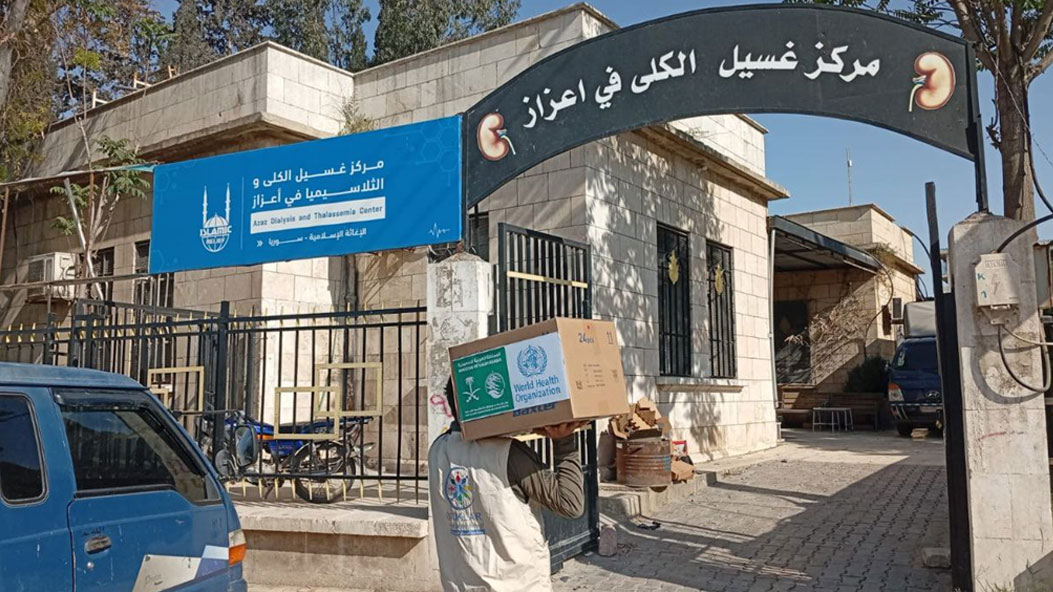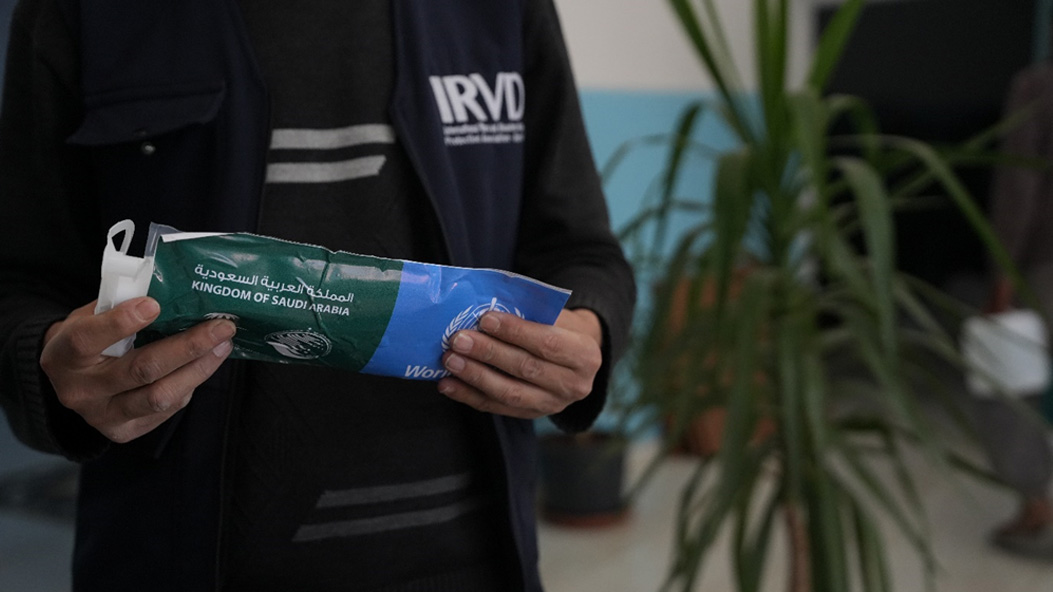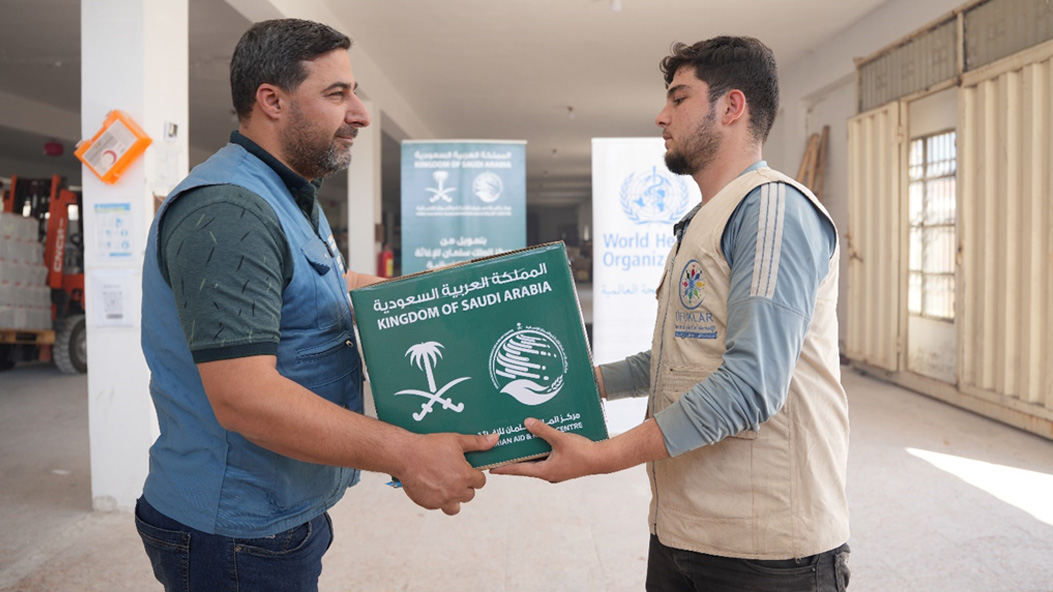 A staff member carries a box of dialysis medicines provided through KSrelief and WHO into a dialysis centre in Azaz. Photo credit: WHO23 September 2025, Afrin, Syrian Arab Republic – Three times a week, 60-year-old Ahmad* makes the long journey from Rajo to Bahar Dialysis Centre in Afrin. Without a car, he relies on relatives or neighbours to take him. For him and hundreds like him, the trip is not optional – it is survival.
A staff member carries a box of dialysis medicines provided through KSrelief and WHO into a dialysis centre in Azaz. Photo credit: WHO23 September 2025, Afrin, Syrian Arab Republic – Three times a week, 60-year-old Ahmad* makes the long journey from Rajo to Bahar Dialysis Centre in Afrin. Without a car, he relies on relatives or neighbours to take him. For him and hundreds like him, the trip is not optional – it is survival.
“There are no dialysis centres in Rajo,” Ahmad explains. “I must come here, even if I cannot afford the transportation costs. If this centre were not here, I do not know how I would survive. To travel further or to buy treatment outside – it is unaffordable.”
The centre provides life-saving dialysis sessions, but shortages still weigh heavily on patients. “Sometimes I have to buy serum or syringes myself,” Ahmad says. “If I don’t, I can’t complete the session. We end up using money meant for bread to pay for supplies. A single dialysis session on the private market can cost the same as a month’s income for some families – far beyond our reach.”
Support from the King Salman Humanitarian Aid and Relief Centre (KSrelief), delivered through WHO, has eased this burden – ensuring that the most critical materials reach centres like Bahar so dialysis sessions can continue.
 At Al-Ameen Dialysis Centre in Afrin, KSrelief- and WHO-supported supplies are checked before use. Photo credit: WHO Ahmad is grateful not only for this support but also for the dedication of the staff. “The nurses and doctors are excellent, they treat us with respect and care,” he says. “But without regular supplies, even the best nurse cannot help. What we need is to make sure the medicines and equipment always reach us.”
At Al-Ameen Dialysis Centre in Afrin, KSrelief- and WHO-supported supplies are checked before use. Photo credit: WHO Ahmad is grateful not only for this support but also for the dedication of the staff. “The nurses and doctors are excellent, they treat us with respect and care,” he says. “But without regular supplies, even the best nurse cannot help. What we need is to make sure the medicines and equipment always reach us.”
Like millions of Syrians displaced from their homes, Ahmad relies on overstretched health services that struggle to keep pace with demand. Across the country, more than half of health facilities remain non-functional, leaving patients with few options close to home. An estimated 15.8 million people require health assistance, and 7.4 million remain displaced, many in protracted situations.
At the same hospital, 32-year-old Mohammad Mustafa faces similar challenges. He travels from Badaleh to Bahar Hospital in Afrin three times a week – a 20-kilometre journey without public transport. “We have to come in our own car,” he explains.
Like Ahmad, Mohammad praises the staff for their compassion and professionalism. “The doctors are very kind and the care is excellent,” he says. But he notes that shortages remain a concern. For a period, even the basic solutions needed for dialysis were unavailable, forcing patients to buy them privately. “Thankfully, now those costs are no longer on us,” Mohammad adds, “and we can focus on treatment rather than worrying about how to afford it.”
 Dialysis materials supported by KSrelief and WHO are delivered to Bahar Hospital in Afrin for safe storage. Photo credit: WHO
Dialysis materials supported by KSrelief and WHO are delivered to Bahar Hospital in Afrin for safe storage. Photo credit: WHO
With the support of KSrelief, WHO is supplying dialysis materials to health facilities across Aleppo and Idlib. By the end of June, 30,000 dialysis treatment courses had already been distributed, with another 5,000 on the way. This has kept machines running and allowed thousands of patients to continue treatment despite conflict, economic collapse and soaring costs of care.
In a country where 3 out of 4 people rely on humanitarian aid, ensuring continuity of services like dialysis is essential. WHO is working with partners to sustain life-saving care during the conflict while also laying the foundation for recovery and reform. Health is one of the few sectors that can help stabilize communities, support returns and strengthen the prospects for peace.
Looking ahead, Mohammad adds, “We know Syria is starting to recover, and that gives us hope. But recovery will take time. For people like us, treatment must not be interrupted. Dialysis is what keeps us alive, and we wish that in the future every patient across the country can find care without fear of it being cut off.”
*Name changed at patient’s request.








